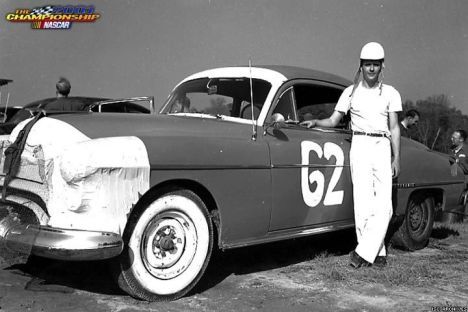The Hamilton Spectator
by Tim Miller
April 9, 2015
Youngest champion Rexford all but forgotten in NASCAR lore
Along with promoting many early races, Otto put together the first televised NASCAR race in 1952, and was behind the stockers-versus sports-cars race at Harewood Acres south of Hamilton in 1959.
Rexford, born in 1927, was from a Conewango Valley, N.Y., a small town about an hour south of Buffalo. In 1949, NASCAR’s top series was called “Strictly Stock,” which evolved into the Sprint Cup Series we know today.
With Otto’s endorsement, Rexford became a team driver for local car dealer Julian Buesink in 1950, driving an Oldsmobile 88. With its potent V8 engine, Oldsmobile was perhaps the hottest car of the time, and one of the few that could compete with the step-down Hudsons of the day. Buesink was no stranger to racing, fielding cars and drivers from 1949 until 1963, including future NASCAR stars Buddy Baker and Cale Yarborough.
So Rexford took to the tracks in 1950, running 17 races of the 19-race NASCAR schedule. Along with 10 top-10 finishes, Rexford won a 200 lap event on the half-mile dirt oval at Canfield, Ohio. This race was called the “Poor Man’s 500” as it was run the same day as the 1950 Indianapolis 500.
He won $1,400 at Canfield. Johnny Parsons won the 1950 Indy 500 and just over $57,000.
It was Rexford’s only victory in NASCAR’s top level, now called “Grand National,” thanks to France, who felt this name used in British horse racing was classy enough for a stock car series.
Rexford was behind Lee Petty, Fireball Roberts and Curtis Turner in Grand National points near the end of the season, but both Roberts and Turner went into slumps during the last races and Petty was docked points by France for running in non-NASCAR events. So Rexford won the first NASCAR title under the Grand National name by 100 points over Roberts.

For his efforts of 1950, Rexford won $5,750 in prize money and a Nash Rambler Convertible as champion. He was not 24 years old, and remains the youngest driver to win a championship in NASCAR’s top level.
Rexford raced 11 times in GN races for 1951, then only three times in 1952 and twice in 1953. He had been involved in a serious crash and his NASCAR racing was never the same.
Rexford continued to race, but at a more local level with the Midwest Auto Racing Club, the forerunner of ARCA, based in Toledo. He was usually a top-10 runner, but there were a couple of racing-related deaths, and he gave up on the sport, moving to Arizona and then California to run his own trucking outfit. Aside from driving an Olds and Chevy during his career, Rexford also piloted Studebakers, Buicks and Mercurys. He died in 1994.
While he has been inducted into several auto racing and sports halls of fame in his native state of New York, Rexford has never received much in the way of accolades from NASCAR itself. In 1998, as part of its 50th anniversary celebration, a panel was selected by NASCAR to honour its top 50 drivers, and Rexford was not on the list.
Rexford was the first and only “northerner” to win a NASCAR championship for over 40 years, as it was not until 1992 that Wisconsin native Alan Kulwicki won NASCAR’s top level, then known as the Winston Cup.
In 1995, 24-year old Jeff Gordon won the championship and became the second youngest behind Rexford to win this award.
Many thanks to Randy Anderson and the Chautauqua Sports Hall of Fame in New York state for background material and photos.
Tim Miller is a longtime motorsports writer and author of several books on the sport.
The additional financial assistance of the community is critical to the success of the Chautauqua Sports Hall of Fame.
We gratefully acknowledge these individuals and organizations for their generous support.











